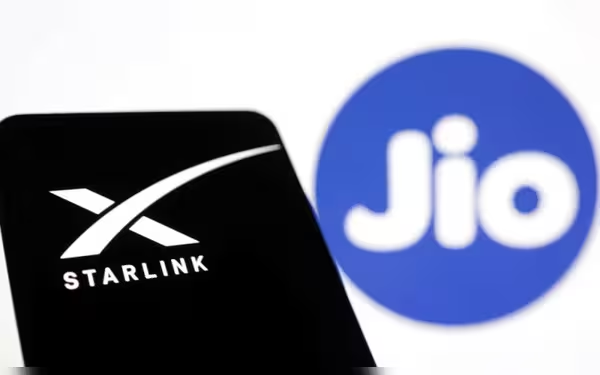Saturday, November 16, 2024 09:55 PM
Reliance and Starlink Clash Over Satellite Spectrum Allocation in India
- Reliance opposes TRAI's administrative spectrum allocation decision.
- Musk's Starlink advocates for global administrative license allotment.
- India's satellite broadband market projected to reach $1.9 billion by 2030.
 Image Credits: brecorder
Image Credits: brecorderThe spectrum allocation dispute between Reliance and Starlink intensifies as TRAI's decision faces criticism amid India's growing satellite broadband market.
In recent developments, the battle for satellite broadband spectrum in India has intensified, particularly between Indian billionaire Mukesh Ambani’s Reliance and Elon Musk’s Starlink. This ongoing dispute revolves around how the Indian government should allocate spectrum for satellite services, a topic that has sparked considerable debate since last year.
Reliance argues that the Telecom Regulatory Authority of India (TRAI) has made an incorrect decision by suggesting that the spectrum should be allocated by the government rather than through an auction process. This is a significant point of contention, as Musk’s Starlink and other global players like Amazon’s Project Kuiper support the idea of administrative allocation. On the other hand, Ambani, who leads Reliance Jio, believes that an auction is necessary to ensure fair competition.
The crux of the issue lies in the interpretation of Indian law regarding spectrum allocation. Some industry experts claim that the law allows for the allocation of spectrum as Musk has proposed. However, Reliance contends that there are no existing provisions for providing satellite broadband services to individual or home users. This disagreement has led to Reliance sending a private letter to India’s telecoms minister, Jyotiraditya Scindia, urging a fresh start to the consultation process, as they believe TRAI has prematurely decided on the allocation method.
In the letter, Reliance’s senior regulatory affairs official, Kapoor Singh Guliani, criticized TRAI for concluding that spectrum assignment should be administrative without sufficient justification. TRAI’s consultation paper suggests that Indian laws require spectrum allocation for such services without conducting any prior studies, a point that Reliance disputes.
As the situation unfolds, TRAI is currently conducting a public consultation, and a senior official from the authority has stated that due process is being followed. Reliance is encouraged to provide feedback during this period, which will ultimately influence the government’s decision on the matter.
The stakes are high, as Deloitte projects that India’s satellite broadband service market will grow by 36% annually, reaching an estimated $1.9 billion by 2030. Musk is eager to launch Starlink in India, but the unresolved issue of spectrum allocation remains a significant hurdle.
Starlink advocates for the administrative allotment of licenses, aligning with a global trend. In contrast, Reliance insists that an auction is essential to create a level playing field, especially since foreign players could potentially offer voice and data services, thereby competing with established local companies.
As Reliance Jio continues to dominate the Indian telecom market with 480 million users, the outcome of this spectrum allocation debate will not only impact the companies involved but also shape the future of satellite broadband services in India. The resolution of this issue is crucial for fostering a competitive environment that benefits consumers and encourages innovation in the rapidly evolving telecommunications landscape.













